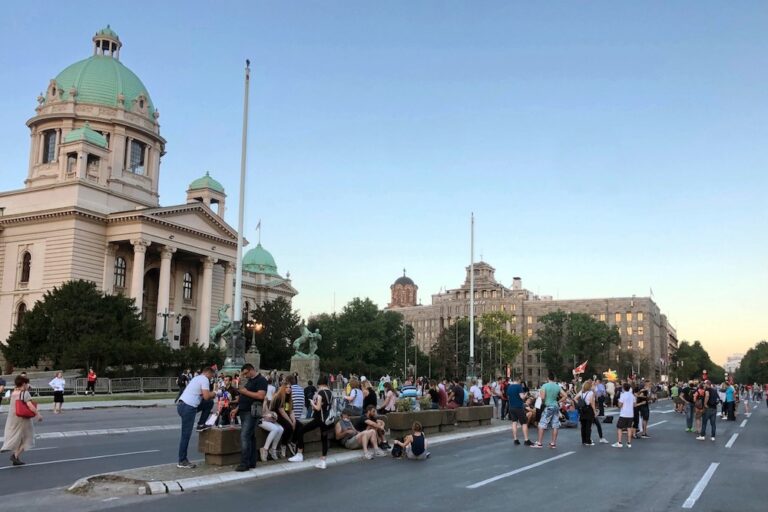(ARTICLE 19/IFEX) – The following is a 6 November 1998 letter sent to President Milosevic of the Federal Republic of Yugoslavia by ARTICLE 19, further to the Serbian government’s comments on various representations it has received regarding the new Public Information Law: **Updates IFEX alerts of 5 November, 26 October, 23 October, 21 October and […]
(ARTICLE 19/IFEX) – The following is a 6 November 1998 letter sent to
President Milosevic of the Federal Republic of Yugoslavia by ARTICLE 19,
further to the Serbian government’s comments on various representations it
has received regarding the new Public Information Law:
**Updates IFEX alerts of 5 November, 26 October, 23 October, 21 October and
20 October 1998**
President Slobodan Milosevic
President of the Federal Republic of Yugoslavia
Belgrade
Federal Republic of Yugoslavia
ARTICLE 19 welcomes the Serbian government’s decision to comment on various
representations it has received regarding the new Public Information Law.
However, despite the explanations for the new Public Information Law offered
by your Ministry of Information in its release of 27 October 1998, we feel
compelled to take this opportunity to express further disquiet about the Law
and the way in which it is being implemented, as well as other recent
official activities which curtail the right of every citizen “to receive and
impart information, regardless of frontiers” as guaranteed under
international law.
As an organisation concerned with upholding freedom of expression (including
media freedom) impartially, ARTICLE 19 has a particular interest in seeking
to guarantee that the media, both state-funded and non-state funded, are
able to function without interference from the authorities.
ARTICLE 19 has a number of concerns about recent actions which restrict
freedom of expression in the areas under your jurisdiction. We believe that
the following run contrary to your government’s obligations under
international law and, possibly, the Yugoslav Constitution:
The Public Information Law, including:
minority languages which the authorities consider to contain ‘political
propaganda’.
charges
can be brought;
information about, or images or voice recordings of any individual are used
in the media;
sitting in emergency session;
fines to
be enforced before an appeal procedure has been completed;
The lack of proportion in charges brought and fines being imposed or
threatened on members of the media and media outlets. For example:
identification signal or face a fine of 7,000 to 75,000 dinars (US$700 to
7,500);
with
Dnevni Telegraf (DM300,000);
Nenad Cekic, for the unauthorised owning and using of a radio station, for
which a custodial sentence may be handed down.
ARTICLE 19 is concerned that citizens of the Federal Republic of Yugoslavia
should have the widest possible opportunity both to receive and impart
information. We will write to you again in the near future in order to
provide you with an expert analysis of the ways in which we consider that
the new Public Information Law falls short of international standards.
In the meantime, I would welcome the opportunity to discuss this matter with
you personally at the earliest possible opportunity. I hope that you will
notify me of a date that is convenient to you and I will arrange my travel
accordingly.
I look forward to hearing from you.
Frances D’Souza
Executive Director
Similar appeals can be sent to:
Appeals To
President Slobodan Milosevic
President of the Federal Republic of Yugoslavia
Belgrade, Federal Republic of Yugoslavia
Fax: +381 11 367 2548
e-mail: slobodan.milosevic@gov.yu


